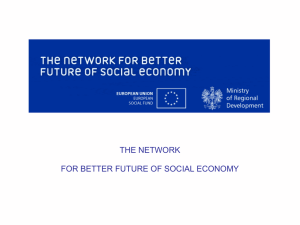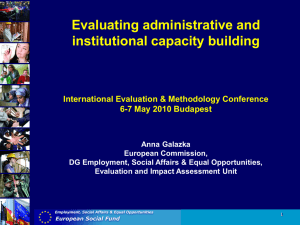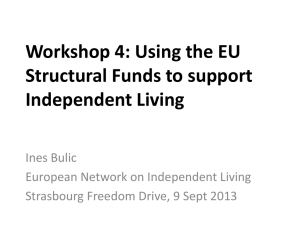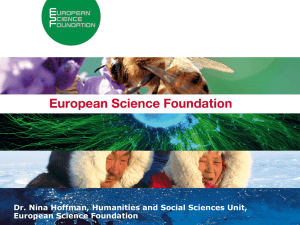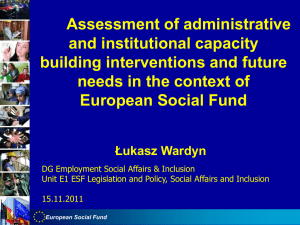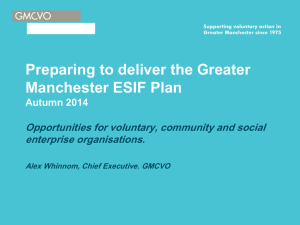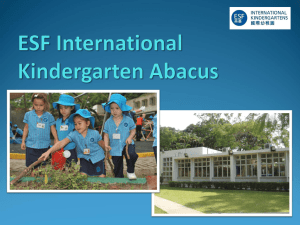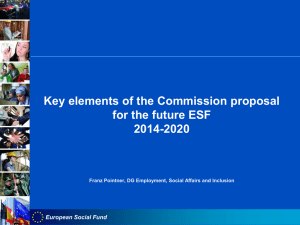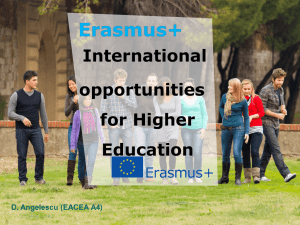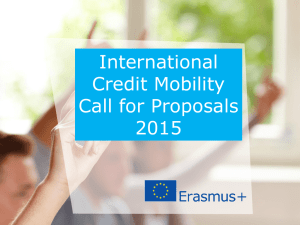An introduction to EU funding for youth, social and employment
advertisement
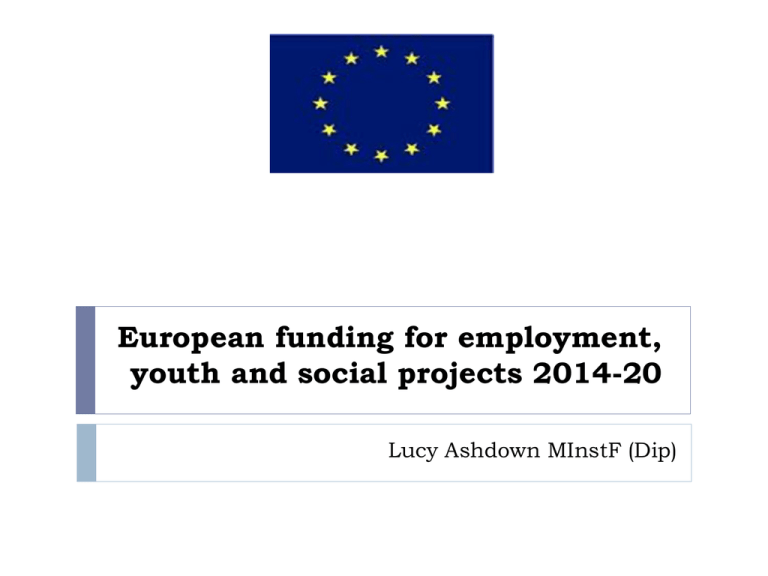
European funding for employment, youth and social projects 2014-20 Lucy Ashdown MInstF (Dip) Today’s Workshop New EU Funding Programmes for employment, youth and social projects 2014-2020 • • • European Structural Integration Funds (European Social Fund) ERASMUS Plus Other EU Funds How can organisations prepare? EU Structural and Investment Funds Support growth and jobs across the EU and delivery of EU 2020 Strategy Comprise European Regional Development Fund (ERDF) and European Social Fund (ESF), plus the Youth Employment Initiative (YEI) in London Europe 2020 Strategy The EU’s strategy for smart, sustainable and inclusive growth Headline targets: 75% employment (ages 20-64) 3% EU GDP investment in Research & Development Achievement of the 20/20/20 climate targets (20% lower greenhouse gas emissions than 1990 levels, 20% of energy from renewables, 20% increase in energy efficiency) 40% of 30-34 year olds should have a tertiary degree, and reducing rates of early school leaving to below 10% 20 million people lifted out of poverty and social exclusion ESIF Delivery Arrangements Local Enterprise Partnerships (LEP) determining strategy for the use of ESIF Proposed allocations in London: • • • £502m European Social Fund (ESF) £176m EU Regional Development Fund (ERDF) £37m new Youth Employment Initiative (YEI) Funding Match funders ‘Opt in’ organisations Total £1.35 billion programme over next 7 years in London including match-funding (EU provides 50%) Programmes due to launch late 2014-early 2015 ESIF Priorities - Overview Priority theme Indicative activities Funding allocation • • Freedoms, flexibilities, funding incentives Informed customers Employer engagement Enhancing the competitiveness of London’s small and medium sized enterprises (SMEs) • • • • • Boost SME growth capacity Facilitate access to finance Trade and export Entrepreneurship Resource efficiency £35m ERDF and £14m ESF Strengthening science and technological development and fostering innovation • • • Connect London Commercialising innovation Low carbon/resource efficient technologies Exploitation of digital technologies £38.5m ERDF Unlocking growth in disadvantaged areas Research and innovation Business workspaces Ultra-fast broadband Low carbon infrastructure £102m ERDF • Skills and Employment • Investing in London’s infrastructure • • • • • £465m ESF and £37m YEI ESF Match-Funders Main • • • • match-funders Skills Funding Agency (SFA) Big Lottery Fund (BLF) – NEW! Department of Work and Pensions (DWP) National Offender Management Service (NOMS) Other match-funders to be secured during implementation • GLA, London Councils/local authorities, further and higher education and civil society organisations Each match-funder developing its own programme, approved by the LEP ESF - Priorities and Indicative Activities Freedoms, Flexibilities and funding incentives ESF • Targeted employability programmes • Job readiness • Tailored employment advice • Basic skills • Progression to higher level skills • Targeted NEET programmes Informed customers Employer engagement • Developing stronger links between education and business • Improving information on post16 career pathways • Extending the National Careers Service • Developing quality apprenticeships and work placements • Skills for business start-up, selfemployment and entrepreneurship • Sector specific business skills for SMES • Growing the social investment market ESF - Target Groups Women BAME groups Older people Lone parents Disabled people Long-term workless Young people aged 15 to 24 People with low-level or no qualifications Disadvantaged families and workless households Those earning less than the London Living Wage ESF - Youth Employment Initiative YEI programme areas London-wide youth programme will invest ~£129m (£73m YEI and £56m ESIF) Preventative NEET NEET re-engagement Targeted NEET interventions (hard to reach/niche target groups) SFA main ‘opt in’; BLF and DWP will also deliver programmes Capacity building for career guidance Co-production of specifications Promoting apprenticeships and young people to businesses Employability skills Face to face guidance Encouraging entrepreneurship skills Employment support for unemployed young people ESF – Big Lottery Programme Ambitions • • • Improve access to ESF funding for civil society organisations £260m nationally To maximise impact of ESF funding Target hardest to reach Challenges • ESF funding criteria, rules, etc. Approach • Expecting large (£5m plus) partnership contracts and mediumsized contracts (£100,000-£500,000) Getting Ready for ESF LVSC ‘VCS Assist’ project provides ESF capacity building, information & networking activities www.vcsassist.org.uk • Contact Steve Kerr, Policy & Project Manager (Employment and Skills), 020 7832 5811 / steve@lvsc.org.uk Technical assistance website run by GLE EU Service at http://esflondon.com ERASMUS PLUS EU Programme in the fields of education, training, youth and sport Supports personal and professional development, and learning Launched1st January 2014 – on-going deadlines 14.7 billion euro budget 2014-2020 Very wide range of organisations can apply Strong international dimension Structure: Three ‘key actions’ to deliver across two priorities: education and training, and youth ERASMUS+ Priority 1: Youth Objectives Improve key competencies and skills of young people, in particular those with less opportunities Priorities Promoting social inclusion and wellbeing, tackling youth unemployment Promoting healthy behaviours - grassroots sports and outdoor activities Quality improvements in youth work Raising awareness of EU citizenship and rights Support development of knowledge and evidence based youth policy and recognition of informal learning Developing basic skills, including entrepreneurship, digital skills, multilingualism Enhancing ICT based training Enhance international dimension of youth activities Coherence between skills and qualifications across EU ERASMUS+ Priority 2: Education & Training Objectives Priorities • Improve level of key competencies and skills, in Developing basic skills, including entrepreneurship, particular in relation to digital skills, multilingualism relevance to labour market and cohesive society Enhancing ICT based training • Foster quality and innovation at level of training and education institutions • Enhance international dimension of in-vocational and higher education, and learning • Improve teaching and learning of languages Improving funding approaches for skills development e.g. partnerships/cost sharing Partnerships between VET and employers in growth areas, aligning VET policies with economic development Reducing low-skilled adults Improving attainment of young people at risk of early school leaving/low skills, including through high quality early education and care Key Action 1 – Mobility of Individuals Overview Large Scale EU Voluntary Service Events Study/work placements for students, apprentices, volunteers Mobility of learners and staff Joint Masters Degree/ Student Loans Teaching and training periods for staff Mobility of higher education students and staff Mobility of VET students and staff Mobility of school staff Mobility of adult education staff Mobility of young people and youth workers (13+) E.g. KA1 Mobility Projects for Young People and Youth Workers Wide range of organisations can apply, including informal groups of young people Must involve at least two organisations from different participating countries (sending and receiving) Deadlines17th March, 30th April, and 1st October each year Funding available for Advance Planning Visit for 2 days Formula contribution to organisational costs and travel costs Three types of actions funded Youth Exchanges for young people aged 13-30 for 5-21 days involving informal learning through mix of activities EU Voluntary Service for young people aged 17-30 for 2-12 months Young people with fewer opportunities - minimum of 2 weeks (organisations must have EVS accreditation). Networking and training for youth workers participation in seminars, training courses and study visits Key Action 2: Cooperation for Innovation and Exchange of Best Practices - Overview Capacity Building in the Field of Youth Knowledge Alliances Sector Skills Alliances Strategic Partnerships in the Field of Education, Training and Youth Aims Promote innovation, exchange of experience and know-how between different organisations Increased quality of learning offer and promote participation in learning E.g. KA2 Strategic Partnerships Partnership – min. 3 programme countries (or 2 for projects in school and youth fields). 2 or 3-year project (6 months to 2 years for youth field) Max. grant 150,000 euros per year (mix of set and real costs) Coordinator applies to National Agency and manages funds for the whole partnership Deadlines: 30th April & 1st Oct Award criteria take into account small projects so they are not disadvantaged Types of actions supported • Exchange of practices e.g. workshops • Develop, test / implement innovative practices • Cooperation between regional authorities for development of fields of education, training and youth • Encourage active citizenship and entrepreneurship • Training, teaching or learning activities for learners and staff Applying to ERASMUS+ UK website: https://www.erasmusplus.org.uk National Agency is British Council/ECORYS Programme Guide http://ec.europa.eu/programmes/erasmusplus/documents/erasmus-plus-programme-guide_en.pdf Sign up to new monthly ERASMUS + newsletter https://www.erasmusplus.org.uk/news/new-monthlyerasmus-newsletter Get advice 0161 9577755 / Erasmusplus.enquires@britishcouncil.org MUST Register on European Commission Authentication Service (ECAS) to apply https://webgate.ec.europa.eu/cas/eim/external/register.cgi Other EU Funding Typical Features of EU Funding Most managed centrally by European Commission (a few by National Agencies) Annual work programmes/Calls for Proposals Transnational Partnerships and EU added value Match-funding requirement Detailed online application proposals Typical activities: • Exchange of best practice and experience (workshops, conferences) • Innovative pilot projects • Research and evaluation • Training and capacity building • Awareness raising Rights, Equality and Citizenship Programme Aims to promote and protect rights deriving from the citizenship of the Union, including the rights of the child, women’s rights and gender equality. Objectives: • • Promoting non-discrimination and equality – combating racism, promoting disabled persons, ROMA & women's rights Protection of rights and empowering citizens – preventing violence against children, young people, women & vulnerable and promoting children’s rights Funding: 439m euros (54m euros in 2014), 80% co-financing Key criteria: Not all calls require EU partners, ~5 EU partners where required Status: 2014 Annual Work Programme published Programme for Employment and Social Innovation Aims to tackle poverty and social exclusion through promoting employment, social inclusion and labour mobility. Objectives include: • • • Improving access to the labour market Supporting development of effective social protection systems Promoting employment and social inclusion (especially youth unemployment) Funding: 919m euros (100m euros for social innovation and policy experimentation). 2014 budget: 70m euros Status: Annual Work Programme published Asylum and Migration Fund Supports the economic, social, cultural and political integration of citizens, residents or natives of countries outside of the EU and the European Economic Area. Objectives: • • • Effective management of migration flows Supporting effective social integration of new arrivals, including asylum seekers and refugees Voluntary assisted return programme Total budget: National Agencies, 3.2 billion Euros; Centrally managed: 637m Euros. 50-90% co-financing rate. Status: Home Office is UK National Agency. Annual Work Programme due late 2014 with first calls for proposals in 2015 Funding Programme Summary Creative Europe Programme (1.8 billion euros ) • Aims to support the European audio-visual, cultural and creative sector. Three strands of the programme support: • Individual mobility of creatives and their works • Support for the audio-visual sector • Access to finance for creative enterprises Europe for Citizens Two funding themes: • EU remembrance • Democratic engagement and civic participation Horizon 2020 (80 billion euros) Health for Growth (446m euros) • EU research and development fund • Support for researchers and partners, addressing societal challenges is a key priority (including health, energy, crime, transport, environment) • Promote public health and healthy lifestyles (obesity, alcohol etc.) • Innovative and sustainable health systems • Cross-border health threats How can organisations prepare? Start small Do your research to identify the most relevant funding streams Access available support Network to identify strong partners Plan ahead – international projects take longer Consider resources and skills required to successfully manage the funding Access Support GLE EU Funding Solutions (consultancy services) www.eufundingsolutions.co.uk: • • • User friendly briefings on EU policy and funding Workshops and training on writing successful applications EU partner search service Rights and Citizenship Programme Workshop on 1st July is FREE. Contact to register: Iwona.w@gle.co.uk NCVO European Network support civil society organisations to access EU funds http://europeanfundingnetwork.eu Newsletters and updates Funding Central partner zone http://www.fundingcentral.org.uk/page.aspx?sp=6293 • EU Programme EU website and further information Rights, Equality and Citizenship Programme http://ec.europa.eu/justice/grants1/programmes-20142020/rec/index_en.htm Programme for Employment and Social Innovation http://ec.europa.eu/social/main.jsp?catId=1081 Asylum and Migration Fund http://ec.europa.eu/dgs/homeaffairs/financing/fundings/funding-home-affairs-beyond2013/index_en.htm Creative Europe http://ec.europa.eu/programmes/creativeeurope/index_en.htm Horizon 2020 http://ec.europa.eu/programmes/horizon2020/en Europe for Citizens http://ec.europa.eu/citizenship/about-the-europe-forcitizens-programme/future-programme-20142020/index_en.htm Health for Growth http://ec.europa.eu/health/programme/policy/index_en.htm Thank you for listening Questions?
